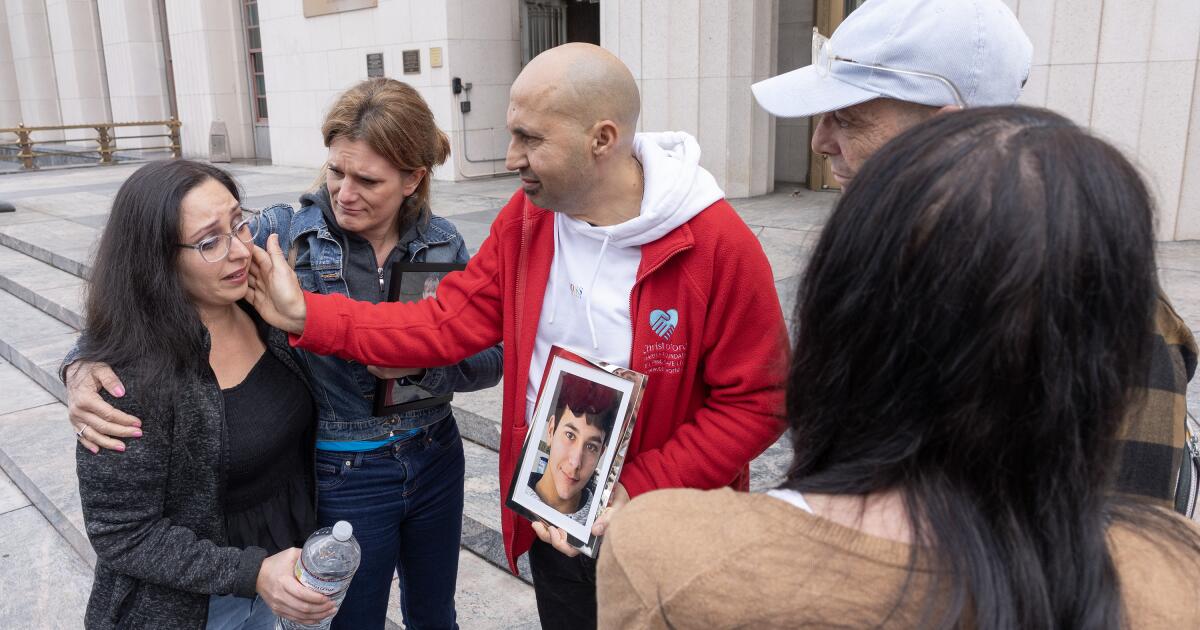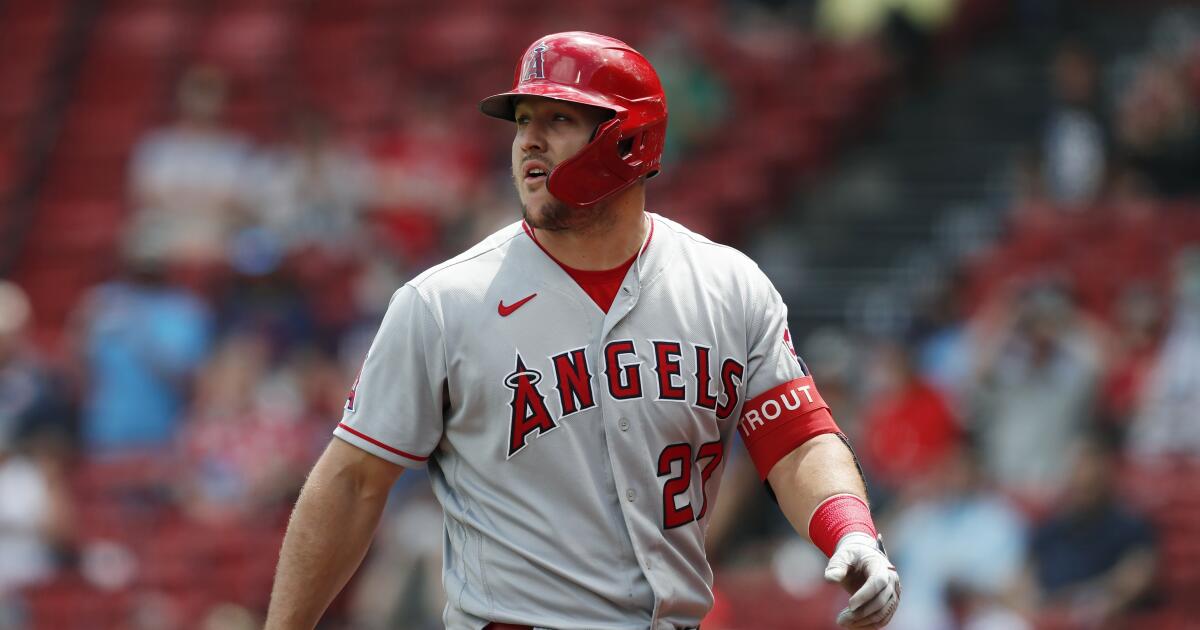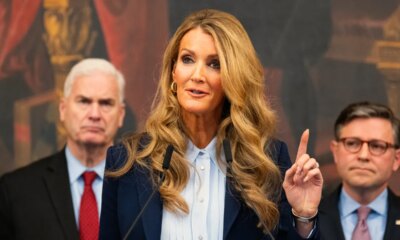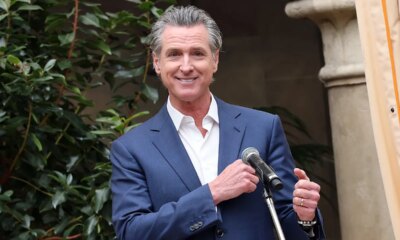Business
My Red Carpet Quest: A Two-Year Search for Steve

Times Insider explains who we are and what we do and delivers behind-the-scenes insights into how our journalism comes together.
Steve Olive was my white whale.
I had been trying for two years to write a profile of Mr. Olive, the co-founder of Event Carpet Pros, the California-based company responsible for custom-making the colorful, though not always red, carpets for thousands of movie premieres, the Golden Globes, the Grammy Awards, the Super Bowl and, since 1997, the Academy Awards.
I learned about Mr. Olive in 2023, while reporting an article about why the organizers of the Oscars were rolling out a champagne-colored carpet that year. My editor, Katie Van Syckle, and I had found the Event Carpet Pros website and we took turns calling the listed number in an effort to reach someone. Finally, Katie connected with Mr. Olive, and briefly interviewed him.
But this mysterious, matter-of-fact, low-key man at the heart of the glitz and glamour of awards season stuck in my mind. I wanted to know more about him. How does one become a rug guy? What had he wanted to be when he grew up? Had he ever attended an award show himself?
Last year, when the Oscars returned to a classic red carpet, Katie and I again agreed that I should pursue a story on Mr. Olive, but he was hesitant. But this year, with the encouragement of the Academy of Motion Picture Arts and Sciences, he agreed. It was three weeks before the ceremony.
Mission: Steve, as I termed it, had officially begun.
I sent a barrage of frantic texts and placed several calls to Brooke Blumberg, a publicist for the academy, trying to nail down when the carpet, which was manufactured at a mill in Dalton, Ga., would arrive at the company’s warehouse in La Mirada, Calif., a city in Los Angeles County.
My goal was to be there when the approximately 30 rolls, each weighing 630 pounds, were unloaded in the Event Carpet Pros parking lot, from a truck that had been driven about 35 hours, from Dalton. The scene, I imagined, would be akin to the arrival of the Rockefeller Center Christmas tree in New York City.
Despite my persistent overtures, Ms. Blumberg informed me that I had missed my chance. The truck had arrived at the warehouse the afternoon before I was planning to fly to Los Angeles.
“Oh darn!” I texted her. “We can hopefully get the install, though!” (The week before the ceremony, the 50,000-square-foot carpet is rolled into place by a crew of 20-some workers on Hollywood Boulevard.)
My next priority was meeting Mr. Olive at his office. But he had the flu, so I was told the interview might need to happen over a video call. Still, Katie and I thought I should go to California to capture the scene. And I wanted to meet his co-workers, as well as talk to the person who orders the red carpet for the Oscars from Mr. Olive each year.
When I finally made the decision to get on a plane, there was a chance that I might have neither the opportunity to talk to Mr. Olive in person nor to see the red carpet. But I bought a seat on a Wednesday afternoon flight and hoped for the best.
On my first day in La Mirada, I scouted out the Event Carpet Pros warehouse, a 36,000-square-foot white structure tucked among palm trees. Then, on Thursday night, I interviewed Joe Lewis, a producer for the Oscars who has ordered the awards show’s red carpet from Mr. Olive for the past 16 years.
On Friday morning, face mask on as a precaution, I visited Mr. Olive — now energetic, his bout with the flu evidently a distant memory — at his office inside the warehouse.
I’d had an idea of him in my head for two years, and I was curious to see if it matched the man. At 6-foot-2, bald and dressed entirely in black, he was somehow exactly as I’d imagined. He was, I learned, a former bodyguard for Mötley Crüe.
He had gotten into the red carpet business in 1992, with his brother-in-law, who installed tents around the country. I met Mr. Olive’s 26-year-old son, Nick, and his co-workers, all of whom told me the same thing: This is a man who doesn’t want, or need, the spotlight; he’s just happy making other people happy.
“I’m not good at this,” said Mr. Olive, as he awkwardly tried to follow the instructions of our photographer, Jennelle Fong, at what must have been his first-ever photo shoot, while standing on the Oscars red carpet.
A bit media shy, it took him some time to open up. And he was never really keen to discuss himself or his days as a bodyguard, for some of the hottest ’80s bands. “I’m not interesting,” he told me.
But I observed him becoming more comfortable as the talk turned to his lifeblood: carpets. He loved talking about his favorite collaborations over the years — all meticulously documented on the company’s Instagram account, which he created in 2013 — and sharing photos of his dog, Olive.
“You’ll make me look good, right?” he asked an hour and a half later, as we parted ways. I promised to send him a copy of the article after it was published.
Over the weekend, it was a frantic scramble to write my article. I wanted to capture not just Mr. Olive’s personality, but also the scope and scale of the modern “red carpet,” not just as a platform for fashion, but as a personal branding opportunity for celebrities. I wanted people to understand why what Mr. Olive was doing mattered.
I submitted my article on Monday morning; Ms. Fong photographed the installation of the red carpet on Hollywood Boulevard on Tuesday; and we had the story ready to go for Wednesday afternoon, when the carpet would be rolled out.
I didn’t get my Rockefeller Center Christmas tree arrival moment. But I witnessed something even better: One unassuming man, who neither wanted nor needed recognition, sharing his joy over his decades-long passion.

Business
Instagram boss defends app from witness stand in trial over alleged harms to kids

A Los Angeles County Superior Court judge threatened to throw grieving mothers out of court Wednesday if they couldn’t stop crying during testimony from Instagram boss Adam Mosseri, who took the stand to defend his company’s app against allegations the product is harmful to children.
The social media addiction case is considered a bellwether that could shape the fate of thousands of other pending lawsuits, transforming the legal landscape for some of the world’s most powerful companies.
For many in the gallery, it was a chance to sit face to face with a man they hold responsible for their children’s deaths. Bereaved parents waited outside the Spring Street courthouse overnight in the rain for a place in the gallery, some breaking into sobs as he spoke.
“I can’t do this,” wept mom Lori Schott, whose daughter Annalee died by suicide after a years-long struggle with what she described as social media addiction. “I’m shaking, I couldn’t stop. It just destroyed her.”
Judge Carolyn B. Kuhl warned she would boot the moms if they could not contain their weeping.
“If there’s a violation of that order from me, I will remove you from the court,” the judge said.
Mosseri, by contrast, appeared cool and collected on the stand, wearing thick wire-framed glasses and a navy suit.
“It’s not good for the company over the long run to make decisions that profit us but are poor for people’s well-being,” he said during a combative exchange with attorney Mark Lanier, who represents the young woman at the center of the closely watched trial. “That’s eventually going to be very problematic for the company.”
Lanier’s client, a Chico, Calif., woman referred to as Kaley G.M., said she became addicted to social media as a grade-schooler, and charges that YouTube and Instagram were designed to hook young users and keep them trapped on the platforms. Two other defendants, TikTok and Snap, settled out of court.
Attorneys for the tech titans hit back, saying in opening statements Monday and Tuesday that Kaley’s troubled home life and her fractious relationship with her family were to blame for her suffering, not the platforms.
They also sought to discredit social media addiction as a concept, while trying to cast doubt on Kaley’s claim to the diagnosis.
“I think it’s important to differentiate between clinical addiction and problematic use,” Mosseri said Wednesday. “Sometimes we use addiction to refer to things more casually.”
On Wednesday, Meta attorney Phyllis Jones asked Mosseri directly whether Instagram targeted teenagers for profit.
“We make less money from teens than from any other demographic on the app,” Mosseri said. “We make much more the older you get.”
Meta Chief Executive Mark Zuckerberg is expected to take the witness stand next week.
Kaley’s suit is being tried as a test case for a much larger group of actions in California state court. A similar — and similarly massive — set of federal suits are proceeding in parallel through California’s Northern District.
Mosseri’s appearance in Los Angeles on Wednesday follows a stinging legal blow in San Francisco earlier this week, where U.S. District Judge Yvonne Gonzalez Rogers blocked a plea by the tech giants to avoid their first trial there.
That trial — another bellwether involving a suit by Breathitt County School District in Kentucky — is now set to begin in San Francisco in June, after the judge denied companies’ motion for summary judgment. Defendants in both sets of suits have said the actions should be thrown out under a powerful 1996 law called Section 230 that shields internet publishers from liability for user content.
On Wednesday morning, Lanier hammered Mosseri over the controversial beauty filters that debuted on Instagram’s Stories function in 2019, showing an email chain in which Mosseri appeared to resist a ban on filters that mimicked plastic surgery.
Such filters have been linked by some research to the deepening mental health crisis in girls and young women, whose suicide rates have surged in recent years.
They have also been shown to drive eating disorders — by far the deadliest psychiatric illnesses — in teens. Those disorders continue to overwhelm providers years after other pandemic-era mental health crises have ebbed.
Earlier research linking social media and harms to young women was referenced in the November 2019 email chain reviewed in court Wednesday, in which one Instagram executive noted the filters “live on Instagram” and were “primarily used by teen girls.”
“There’s always a trade-off between safety and speech,” Mosseri said of the filters. “We’re trying to be as safe as possible but also censor as little as possible.”
The company briefly banned effects that “cannot be mimicked by makeup” and then walked the decision back amid fears Instagram would lose market share to less scrupulous actors.
“Mark [Zuckerberg] decided that the right balance was to focus on not allowing filters that promoted plastic surgery, but not those that did not,” Mosseri said. “I was never worried about this affecting our stock price.”
For Schott, seeing those decisions unfold almost a year to the day before her daughter’s death was too much to bear.
“They made that decision and they made that decision and they made that decision again — and my daughter’s dead in 2020,” she said. “How much more could that match? Timeline, days, decisions? Bam, she was dead.”
Business
Meta, TikTok and others agree to teen safety ratings

Meta, TikTok and Snap will be rated on their teen safety efforts amid rising concern about whether the world’s largest social media platforms are doing enough to protect the mental health of young people.
The Mental Health Coalition, a collective of organizations focused on destigmatizing mental health issues, said Tuesday that it is launching standards and a new rating system for online platforms. For the Safe Online Standards (S.O.S.) program, an independent panel of global experts will evaluate companies on parameters including safety rules, design, moderation and mental health resources.
TikTok, Snap and Meta — the parent company of Facebook and Instagram — will be the first companies to be graded. Discord, YouTube, Pinterest, Roblox and Twitch have also agreed to participate, the coalition said in a news release.
“These standards provide the public with a meaningful way to evaluate platform protections and hold companies accountable — and we look forward to more tech companies signing up for the assessments,” Antigone Davis, vice president and global head of safety at Meta, said in a statement.
TikTok and Snap executives also expressed their commitment to online safety.
Parents, lawmakers and advocacy groups have criticized online platforms for years over whether they’re protecting the safety of billions of users. Despite having rules around what content users aren’t allowed to post, they’ve grappled with moderating harmful content about self-harm, eating disorders, drugs and more.
Meanwhile, technology continues to play a bigger role in people’s lives.
The rise of artificial intelligence-powered chatbots has heightened mental health concerns as some teens are turning to technology for companionship. Companies have also faced a flurry of lawsuits over online safety.
This week, a highly watched trial over whether tech companies such as Instagram and YouTube can be held liable for allegedly promoting a harmful product and addicting users to their platforms kicked off in Los Angeles.
TikTok and Snap, the parent company of disappearing-messages app Snapchat, settled for undisclosed sums to avoid the trial.
In opening statements, one of the lawyers representing the California woman who alleges she became addicted to YouTube and Instagram as a child said the products were designed to be addictive.
Tech companies have denied the allegations made in the lawsuit and say internal documents are being twisted to portray them as villainous when there are other factors, such as childhood trauma, leading to the mental health issues of some of their users.
Meta Chief Executive Mark Zuckerberg is expected to testify at the Los Angeles trial. Another trial over a lawsuit that alleges Meta failed to protect children from sexual exploitation and violated New Mexico’s consumer protection laws also kicked off this week.
The new ratings were also announced on Tuesday on Safer Internet Day, a global campaign that promotes using technology responsibly, especially among young people. Companies on Tuesday, such as Google, outlined some of the work they’ve done around safety, including parental controls to set time limits for scrolling through short videos.
The ratings will be color-coded, and companies that perform well on the tests will get a blue shield badge that signals they help reduce harmful content on the platform and their rules are clear. Those that fall short will receive a red rating, indicating they’re not reliably blocking harmful content or lack proper rules. Ratings in other colors indicate whether the platforms have partial protection or whether their evaluations haven’t been completed yet.
“By creating a shared framework for accountability, S.O.S. helps move us toward online spaces that better support mental health and well-being,” Kenneth Cole, the fashion designer who founded the Mental Health Coalition, said in a statement.
A website for S.O.S. states that technology companies didn’t influence the development of the new standards and they aren’t funding the project. The Mental Health Coalition, though, has teamed up with Meta in the past on other initiatives. Meta and Google are also listed as “creative partners” on the coalition’s website.
The coalition, which is based in New York, didn’t immediately respond to an email asking about its funding.
Companies have published their online rules and data on content moderation. Those that are interested in participating in the project voluntarily hand over documents on policies, tools and product features.
Business
MLB to begin streaming in-market games for Angels, Dodgers, Padres and other teams

Major League Baseball is making streaming options available for fans to watch in-market games of 20 teams, including the Dodgers, Los Angeles Angels, San Francisco Giants and San Diego Padres — a significant shift to respond to the fast-changing TV landscape.
The Angels on Tuesday announced its arrangement with the league to make its games more widely available. The club said the option — Angels.TV — would be available for purchase for $99.99 for the full season or $19.99 per month through the MLB app.
“We are excited to partner with Major League Baseball to bring Angels games to their streaming platform,” Angels President John Carpino said in a statement. “Our priority is making it as easy as possible for fans to watch Angels Baseball and MLB’s industry-leading app provides another great option to stay connected to the team.”
The league separately announced the move, which provides options for fans of other teams, through its MLB app. In-market games for the Arizona Diamondbacks, Baltimore Orioles, Cincinnati Reds, Cleveland Guardians, Colorado Rockies, Kansas City Royals, Miami Marlins, Milwaukee Brewers, Minnesota Twins, New York Mets, Philadelphia Phillies, St. Louis Cardinals, Seattle Mariners, Tampa Bay Rays and Washington Nationals will be provided through the app.
Games will still be available to traditional pay-TV subscribers.
Spectrum, owned by cable giant Charter Communications, which distributes the Dodgers’ SportsNet LA, had previously made available Dodger games as a streaming option through a separate app.
On Tuesday, ESPN announced that it would become the new streaming home of MLB.TV, bringing out-of-market live games to the ESPN App and ESPN.com.
“With MLB.TV now available through ESPN, we’re taking a significant step forward in reinforcing ESPN as the home of the MLB regular season while deepening the value proposition of the ESPN Unlimited plan — giving fans even more flexibility in how and where they watch all season long,” Rosalyn Durant, executive vice president, ESPN Programming & Acquisitions, said in a statement.
The move comes as traditional regional sports networks struggle amid the exodus of pay-TV customers. Regional sports networks once were viewed as cash cows for teams and TV programming companies that owned them, but, in recent years, at least one regional sports network owner has filed for bankruptcy. That prompted the MLB to step in to fill the gap.
The league said it also was taking over the television production of games for 14 teams, including the Padres and Arizona Diamondbacks.
-

 Politics6 days ago
Politics6 days agoWhite House says murder rate plummeted to lowest level since 1900 under Trump administration
-

 Alabama5 days ago
Alabama5 days agoGeneva’s Kiera Howell, 16, auditions for ‘American Idol’ season 24
-

 Indiana1 week ago
Indiana1 week ago13-year-old boy dies in BMX accident, officials, Steel Wheels BMX says
-

 Politics1 week ago
Politics1 week agoTrump unveils new rendering of sprawling White House ballroom project
-

 Culture1 week ago
Culture1 week agoTry This Quiz on Mysteries Set in American Small Towns
-

 San Francisco, CA1 week ago
San Francisco, CA1 week agoExclusive | Super Bowl 2026: Guide to the hottest events, concerts and parties happening in San Francisco
-

 Ohio7 days ago
Ohio7 days agoOhio town launching treasure hunt for $10K worth of gold, jewelry
-

 Education1 week ago
Education1 week agoVideo: We Tested Shark’s Viral Facial Device























